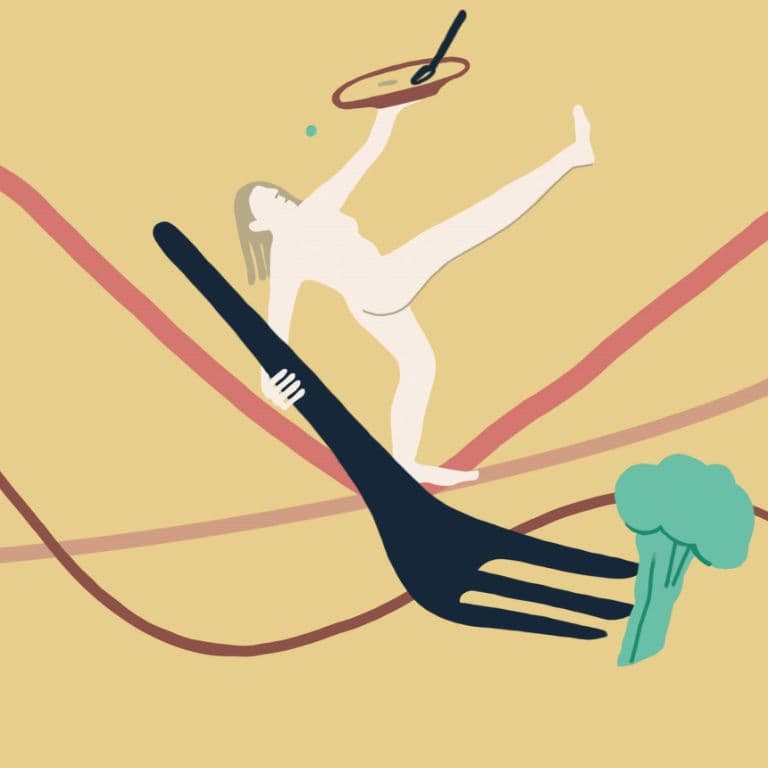What happens to our reproductive system when we take up crash diets?
It has been seen that women who take up crash diets often experience amenorrhea which is absence of periods more than 3 months due to extreme weight loss and starving the body of food.
Now let’s understand what happens when we deprive our body of calories. When deprived of calories, the body tends to prioritise certain systems over others and devotes less energy to processes that are perceived as not essential to staying alive— such as growth and reproductive functions. The controller of most hormones in the body is the hypothalamus and, in such energy-deficient situations its function is suppressed, in turn affecting reproductive hormones.
Functional Hypothalamic Amenorrhea (FHA) is an extreme form of menstrual disturbance that can occur from a negative energy balance. When someone has a negative energy balance, the levels of hormones released from the hypothalamus may change. Similarly, Gonadotropin releasing hormone (GnRH), which is normally released throughout the day can decrease in frequency due to extreme energy restriction.
With less GnRH, the release of luteinizing hormone (LH) and follicle stimulating hormone (FSH) is altered in timing and in amounts. Without enough stimulation from these hormones, ovarian follicles—the sacks that contain your eggs in the ovary—do not receive enough stimulation to grow, adequate levels of estrogen are not produced, and ovulation may not occur.
Those who have FHA often demonstrate low estrogen, low progesterone, an absence of LH and estrogen peaking around ovulation, and no menstrual period.
In amenorrhoeic people, with severe restricting eating patterns, the period itself acts as an extra vital sign — an indicator for your overall health.
Pregnancy is an extremely demanding time, and if someone cannot support their own body functions, that person will, in most likelihood,not be able to support another body growing inside of them, requiring even more energy.

The effects of crash diets on the body
Many of these changes are reversible when a person recovers and improves their body weight and nutritional intake but some damage such as bone density loss, may be more persistent.
Gallstones: The gallbladder is a pouch in your body near the liver that stores your bile. The bile helps you metabolise fat. Rapid weight-loss (3 pounds or more per week) increases your risk of forming gallstones. Losing and regaining weight repeatedly which is also known as weight cycling may increase the risk for gallstone formation.
Loss of muscle and bone health: Severe calorie deprivation can affect bone and muscle health that leads to fragility and increased complications as people age. Women with persistent nutrient deprivation are at an increased risk of osteoporosis.
Vitamin deficiencies: The risk of limiting yourself to only certain kinds of foods are that you may miss out on vital vitamins and minerals. These deficiencies can give rise to subsequent anaemia and unpleasant skin and hair changes. Women experience having brittle hair and nails and dry skin. Crash diets also minimize fat intake, in turn affecting the absorption of fat soluble vitamins – A,D,E and K. This in turn, also negatively impacts immunity.
Rebound effect: Depriving yourself of calories simply means that your body perceives that it is starving. In turn, it slows down your metabolism and you lose weight slower. Weight gain is also fast after exiting from these diet regimens.
Mental health changes: It has been observed that in persons preferring crash diets, they are more likely to be high-achievers and to express rigid control over their emotions, environment, and thinking patterns. The drive to lose weight and the fear of gaining fat usually do not decrease with actual weight loss. It can lead to a vicious cycle where the person becomes even more fixated with losing weight.
Erratic blood sugars throughout the day can also cause irritability and leave the person feeling very low on energy.
The solution?
- Set realistic goals for weight loss and exercise.
- Don't deprive yourself or your body of vital nourishment.
- Be kind to yourself
- Cut down alcohol and sugary drinks
- Limit processed foods
- Aim for fitness and thinness, weight loss is not the be all, end all of everything.
Crash diets or extreme weight-loss diets can help achieve a rapid weight reduction. These diets are either very low in carbohydrate or very low in fat. However, such diets are not sustainable in the long run as the weight lost is regained within a short period of time. Motivational counselling can also help people in their weight loss journey. Healthy weight loss can best be achieved through balanced, healthy, nutritious diets which are low in calories, combined with adequate physical activity.
To know more on the sexual and reproductive health of women, visit https://www.proactiveforher.com/
Disclaimer: This information is educational and should not be construed as medical advice. Please consult your doctor before making any dietary changes or adding supplements.
Proactive For Her is a digital clinic for women, offering accessible, personalised, and confidential healthcare solutions. We offer out-patient care, diagnostic services and programs for various health concerns of Indian women, across their lifetime - from puberty to pregnancy to menopause.

